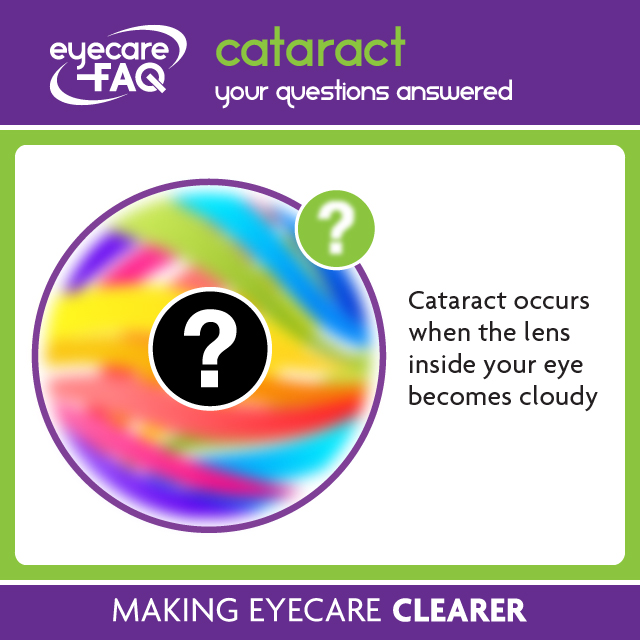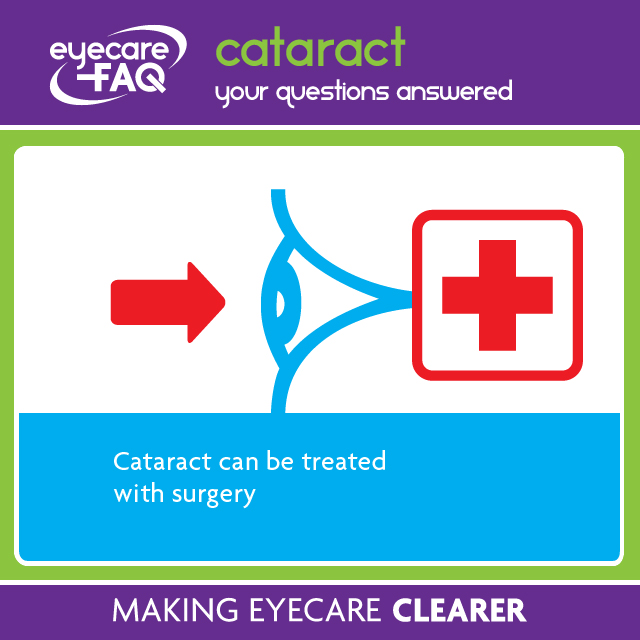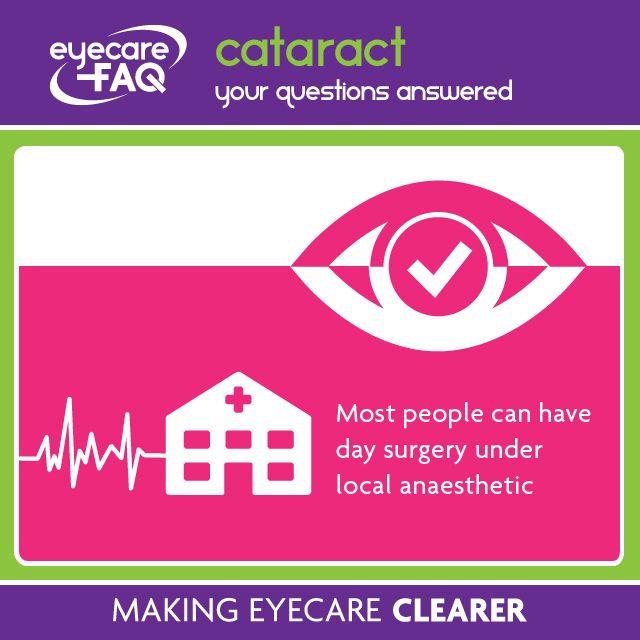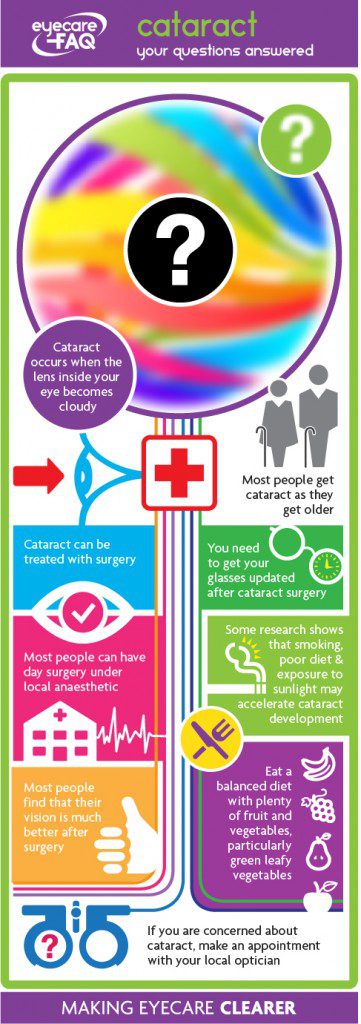What is a cataract?
Inside your eye is a clear lens. It is there to focus rays of light on the back of the eye. As you get older the lens can become less clear: this is known as cataract. It causes problems because the clouding of the lens cuts the amount of light that passes through and scatters the light that does get through, thus dimming and blurring the vision.
Cataracts often develop slowly and can affect one or both eyes. You may notice colours appearing more faded, blurry or double vision, halos around light, trouble with bright lights, and trouble seeing at night however often the changes are so gradual that they are only noticed at a routine sight test at your local opticians.
Can cataract be treated?
If your optometrist has told that you have cataract the good news is that this is usually a treatable cause of sight loss, often as day surgery.
The vast majority of people with cataract will find that their vision is much improved after surgery. The overall success rate of cataract surgery in the UK is over 95 per cent and the chances of a serious or sight-threatening complication are less than 1 in 500. After cataract surgery you may need to get your glasses updated and then you will be able to carry on with daily life as normal.
How common is cataract?
More than one in two people aged 65 and older have some signs of cataract, and it is present for almost everyone over 75.
How does cataract develop?
For older people, cataracts develop slowly and painlessly as part of the natural ageing process.
Can I prevent cataract developing?
Wearing good quality sunglasses with UV blocking lenses or UV blocking spectacles or contact lenses can protect you from UV rays which contribute to the development of cataract. Ask the dispensing optician at your local practice for advice. Although there are supplements on the market which claim to help slow the progression of eye problems including cataract, medical opinion is divided on whether these help and there is no robust evidence for their benefits. Professionals suggest eating a balanced diet with plenty of fruit and vegetables, particularly green leafy vegetables is good for your general “eye health”. Some research papers show that smoking, poor diet and exposure to sunlight may accelerate cataract development.
Apart from old age, what are the other causes of cataract?
The majority of cataracts are due to old age. However, they can occur due to other reasons including:
- Eye Injury
- Certain types of medication
- Illnesses such as diabetes
- Longstanding inflammation
- Certain types of eye surgery
UV light plays a role in the development of cataract. Hypertension, smoking, previous eye surgery and high myopia can all increase your risk of developing cataract. A small number of babies are born with cataracts. Cataract can run in the family too.
How do I know I have cataract?
You might notice that your vision is less clear than before. A cataract can make things blurry, like looking through frosted glass. Some people notice a colour change, particularly if a cataract is present in one eye only, when things develop a yellowish tint or appear more faded. You might find the vision in one eye is more blurred than in the other. People with cataracts can have problems with night vision and glare.
If you notice anything like this happening, call your optician. However often the changes in vision associated with cataract are very slow in developing and only a routine sight test can detect them.
I have been told that I have cataract. What happens next?
When you find that your vision is causing problems with your life, your optometrist may write to your GP or the local eye referral centre explaining that you have cataract. (In some areas your optometrist can refer you directly to an eye specialist centre.) Arrangements will be made for you to be seen at the local eye clinic to discuss if an operation to remove the cataract is appropriate. At this appointment the eye specialist will look at your eyes and ask you in detail about any visual problems that you are having. They will also ask about your general health to ensure that the operation is suitable for you. Before agreeing to surgery they will outline the risks and benefits of the operation and make sure that you understand what will happen. Your eyes will be measured to work out the correct strength of replacement lens that would suit you best.
In Scotland you will be referred through SCI gateway to the hospital where you will be assessed to see if the operation is necessary.
I have cataract in both eyes. Can they both be removed at once?
Surgeons will generally operate on one eye at a time in case there are any problems. However, both eyes can be operated on one after the other at the same sitting should you prefer.
I have had cataract removed from one eye only
If you have had a cataract removed from one eye it is likely that you will need the same treatment for the other eye at some point in the future.
Will I need to stay in hospital and have a general anaesthetic for my cataract removal?
Currently the majority of cataract operations are performed as day surgery under a local anaesthetic. You will be asked to come to the hospital at the appropriate time, then you will have your operation and then go home the same day. Make sure you arrange for someone else to take you home.
What happens during the cataract operation?
When you have cataract surgery you will be given an anaesthetic so that you don’t feel what is happening. For most people this is a local anaesthetic consisting of an injection or sometimes just eye drops alone. You will be awake, but the anaesthetist will make sure you do not feel the area around your eye. You will hear the eye specialist explaining what they are doing, but you will not see anything that is going on. At most, you will be aware of some vague movements around the eye. The specialist makes a tiny incision in the eye to remove the cataract, and will, in most cases, insert a plastic replacement lens to carry on the job of focusing light on the back of your eye. This will usually take around 30 minutes. Your eye may then be covered to help protect it for the next 24 hours, as it starts to recover.
What happens after a cataract operation?
You will be told how to look after your eye before you leave the hospital. You will be given eye drops to use for the next month to prevent infection and inflammation. Your eye will look a little red and feel somewhat gritty in the days after the operation but this should improve day by day. If you have any concerns, give the eye clinic a call for advice. In many areas you will be asked to attend your local opticians practice for a “post cataract check up”- this is free of charge and is usually six weeks after your operation. Your local hospital who carries out the surgery will be able to advise you about your post operative care in more detail.
What activities should I avoid after a cataract operation?
After the operation you can carry on with activities round the home as normal. Avoid eye makeup and try not to get soapy water in your eyes when you wash your hair. If you go out on a windy day you may feel safer with sunglasses to prevent grit getting in your eye. Ask your specialist about when you can return to work. If you have any concerns, give the eye clinic a call for advice.
How soon can I expect to see better after a cataract operation?
Be careful walking around as vision will be different after surgery, so be careful of falls and bumping into objects. Your eye sight will settle down usually in a few days although sometimes it can take a week or two. Your vision is often blurred for the first twenty-four hours so you should not feel disappointed if your eyesight is not clear on day one. You will soon find fewer problems with glare and an improvement in your colour vision. If you have any concerns, give the eye clinic a call for advice.
Your current specs won’t have the right prescription once your operation has been done. You will need to have your eye sight tested and may need new glasses. You may receive a letter from the hospital with a date from when your post operative appointment and eye examination can proceed. Make an appointment for this to take place approximately six weeks after the operation: your eye specialist can advise when your eye will have settled at the aftercare appointment. You may need to wait until your spectacles have been updated to start driving again.
What are multifocal lens implants?
There are now lens implants available that are “multifocal” and these may enable you to see for distance and for reading without the need for glasses. They are not suitable for everybody but studies have shown that 80-90 per cent of people who have these implants become spectacle independent. Although these lenses are not perfect they produce a very high level of satisfaction in those who are suited to them. There are also available lens implants that neutralise any naturally occurring astigmatism or irregular curvature of the front of the eye. Unfortunately, these are not yet routinely available on the NHS as they are relatively expensive.
What are the long term results after cataract removal?
For most people, a cataract operation is entirely successful and will give them clear vision. After some months or years, a minority of people notice that their vision becomes cloudy again in the eye where the cataract has been removed. This is due to clouding of the sac which contains the replacement lens. This cloudiness can be removed with a painless and effective laser treatment in a matter of minutes. Contact your local opticians practice if you are concerned that this is happening to you.
I care for someone who has cataract. How can I help them?
Cataract is something that many of us will experience as we get older. If you are caring for someone with cataract you can help by ensuring their eye tests are up to date and even arranging lighting in the home can help to avoid glare problems. You may need to accompany the person to eye appointments and bringing them home after surgery. They may need eye drops after the surgery for a short while.
I’m worried I have a cataract. What should I do?
If you suspect that you have cataract make an appointment for an eye test. It is important to get a professional to check your eye health as blurred vision can have a number of causes.
If you know that you have cataract and it is causing problems with your daily life then ask your optometrist or GP for a referral to the hospital eye clinic. In Scotland the Optometrist is the first port of call for any eye conditions or issues and can refer you if you need.






